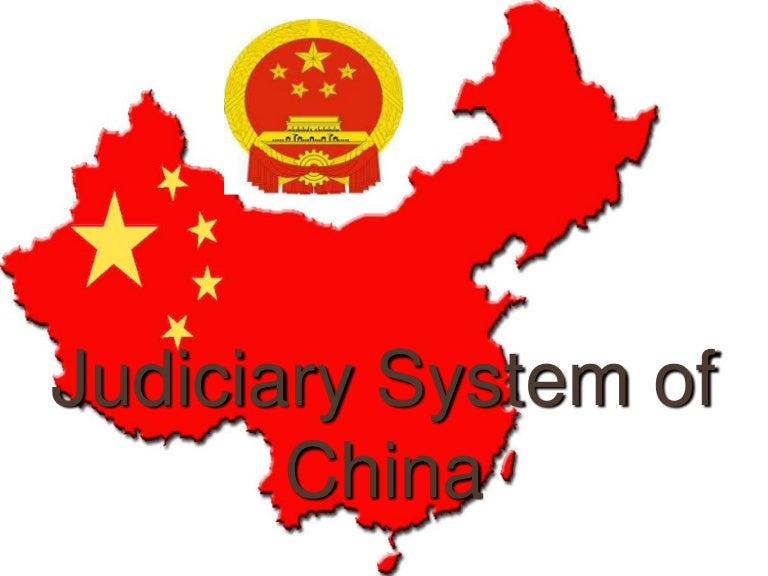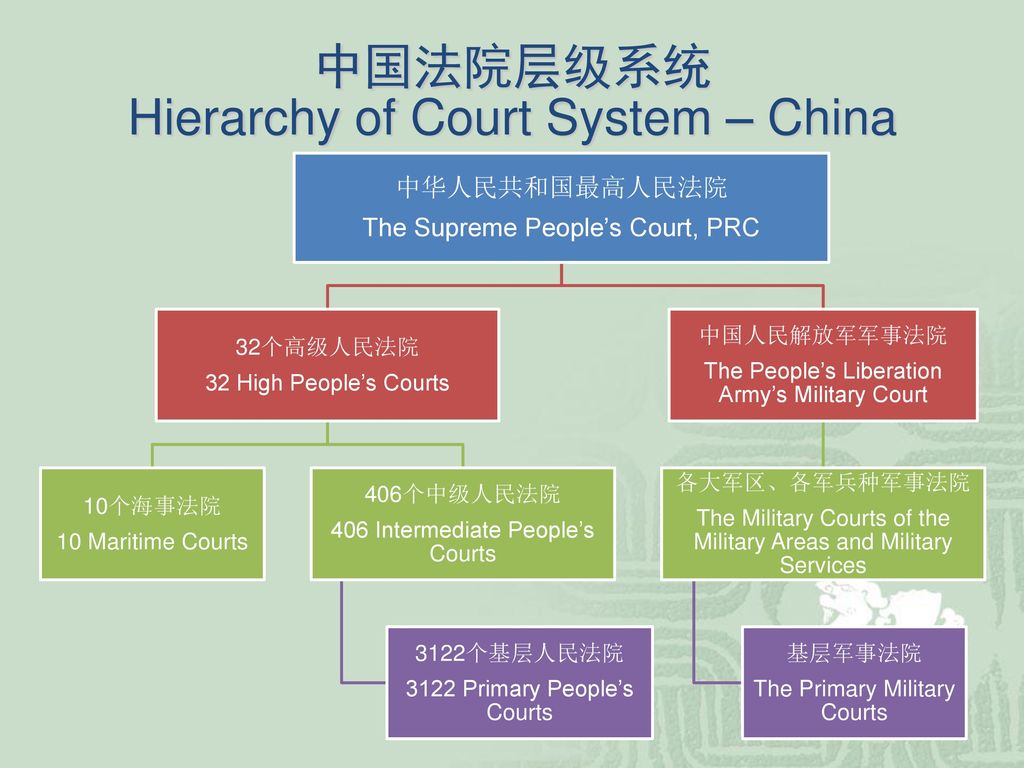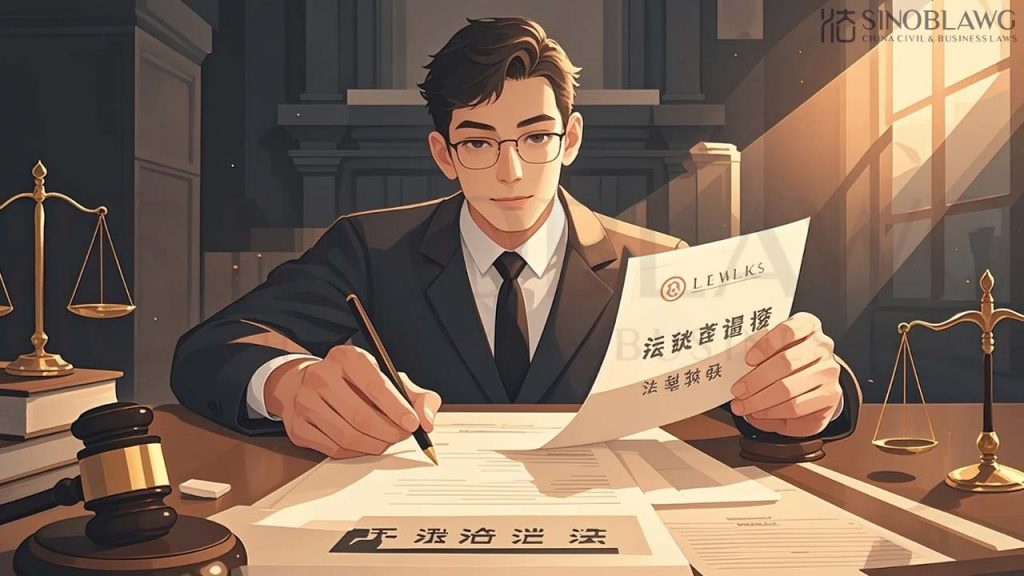

- Brief Summary
As a jurisdiction of civil law system, the civil judicial system in China is different from those of common law countries, and China civil judicial hierarchy system can be summarized as “2+1+1”, namely:
“2”: Generally, civil cases shall be finally adjudicated after concluding of two instances of court proceedings, which are usually known as proceeding of court of first instance, and the proceeding of appellate court, or the court or second instance.
“+1”: Under specific circumstances, the parties may also apply to a higher[1] court for retrial of the case after the judgement enters into force.
“+1”: If the application for the retrial is dismissed by the court, the parties could apply to the procuratorate for review of the case. The court will be requested to retry the case if the application is admitted, but this happens rarely in practice.
It seems difficult for those who are unfamiliar with China’s court system to have a comprehensive understanding from the brief introduction above. In this regard, we depict this structure of the hierarchical civil judicial system in China in detail as below, for your reference.
2. Most Civil Cases are Concluded after the Second Instance
First, it helps to know the hierarchy of China courts. As a centralized country, China has four (4) layers of courts (so called “the people’s courts”):
(1) basic or primary courts, or the bottom level courts at district or county level; generally, a municipal city (like Beijing, Shanghai or Shenzhen or Guangzhou) comprises several districts or counties in their respective territory.
(2) then immediately above the basic courts are the intermediate courts at the municipal level. In light of the size of its population, a municipal city may have one or two (2) or three (3) intermediate courts;
(3) then next higher courts are High (people’s) courts at provincial level, and there is only one (1) high court in each province in China; and
(4) finally at the top is the China Supreme Court and its six (6) circuit courts.

Generally, the first instance of civil cases shall be tried by the primary or basic people’s courts. Only the civil and commercial cases with huge amount of subject shall be first tried by the intermediate people’s courts or the high people’s court. Besides, in some cities, the intermediate people’s courts have the jurisdiction over the first instance of foreign-related cases.
Unlike many other jurisdictions, China Civil Procedure Law[2] provides for definite time limits on each proceeding of court in administering domestic cases (not foreign-related cases). For example, the time limit for concluding the trials of first-instance is six (6) months from the date when the case is filed. Where an extension is required under special circumstances, another six (6) months extension may be given subject to the approval of the president of the court. In practice, such extension rarely happens. For simple domestic cases, a summary proceeding may be conducted and shall run throughout its course within three months.
After the proceeding of fist-instance is concluded, if the parties refuse to accept the judgement, they can appeal to the next higher court for a second-instance trial. In a domestic case, the unhappy part has fifteen (15) days to appeal from the date of receipt of the first-instance judgement, but for the parties without domicile in China (mainly, referring to foreigners or foreign entities), they have thirty (30) days to launch an appeal. As we mentioned in our previous articles, the overseas materials originating in foreign countries need to be notarized and legalized in accordance with the Civil Procedure Law and its interpretation. Preparing relevant documents in such a short time is sometimes a challenge for the foreign litigants.
As stipulated in Article 175 and 176 of China Civil Procedure Law, the people’s court shall conclude the second-instance case within three (3) months. Any extension of the time limit necessitated by special circumstances shall be subject to approval by the president of the court. The second-instance judgement shall be the effective and final one and the parties can apply for the enforcement thereof.
As you have noticed above, those time limits on court proceedings apply to domestic cases only. China Civil Procedure Law makes it clear in Article 270 that those time limits don’t apply to foreign-related cases. In other words, a foreign-related case can drag well beyond those limits, though in practice, in most cases, courts will still strive to close foreign-related cases in their hands within six (6) months.
3. Exception of Simple and Small Claim Cases
For simple civil cases tried by primary people’s courts, if the amount in controversy is less than 30% of the average annual salary in the previous year of the province involved, the case shall be concluded within three months and the parties concerned shall not appeal.[3]It is worth noting that such a rule doesn’t apply to foreign-related civil cases.
4. The Retrial and Procuratorate for Case Review
In case a judgment of a case takes effect, any party who finds fundamental errors existing in the judgement can apply to the immediate superior people’s court for retrial within six (6) months after the judgement becomes effective.[4]The errors include omission of evidence, errors in application of law, violation of litigation procedure and so on[5]. The decision for retrial shall be made by a higher court after the examination within three (3) months upon receipt of the retrial request (again, these three (3) months limit doesn’t apply in foreign-related cases). Where the circumstances of the case meet the applicable provisions of the Law, a retrial shall be ordered[6]. Before the initiation of the retrial procedure, the enforcement of the effective judgement should be continued.
If the application for retrial is dismissed by a higher court or there are still mistakes in the retrial judgment, the parties may apply to the procuratorate for further actions[7]. The people’s procuratorate shall examine the retrial application within three (3) months after the receipt thereof and decide whether to make a procuratorial proposal or objection, after which the parties are no longer allowed to petition to people’s procuratorate again.
Based on the estimated statistics and our experience, only 10% of the retrial application is approved by the courts, much less the procuratorate for case review.
5. What We Propose
From all above, the civil judicial system in China is quite complicated. Depending on the facts of different cases, various kinds of problems may arise from every instance of the case. If a retrial is needed, the case can be extremely tricky. In order to lower the risks and win the case, it is essential to consult an experienced Chinese lawyer before commencing any of the proceedings.
[1] The courts in China are divided into four levels in accordance with the descending order of powers, i.e., the Supreme People’s Court (the SPC), high people’s courts, intermediate people’s courts, and primary people’s courts.
[2] Article 149 of China Civil Procedure Law,
” when handling a case to which ordinary procedure is applicable, a people’s court shall conclude the case within six months from the date of placing the case on file. Where an extension is required under special circumstances, a six-month extension may be given subject to the approval of the president of the court. Any further extension shall be reported to the people’s court of higher level for approval.”
[3] In accordance with Article 162 of Civil Procedure Law,
[4] Article 199 of Civil Procedure Law:
“……as for the case where one party comprises of a large number of individuals or both parties thereto are citizens, the parties may apply for retrial of the case to the original people’s court. Nevertheless, the application for retrial does not mean that the enforcement of the judgment or ruling is suspended.”
[5]In accordance with Article 200 of Civil Procedure Law.
[6] In accordance with Article 204 of Civil Procedure Law.
[7] Article 209 of Civil Procedure Law:” Under any one of the following circumstances, a party may apply to the competent people’s procuratorate for a procuratorial proposal or objection:
- where the people’s court rejects the retrial application;
- where the people’s court does not issue a ruling over the retrial application within the specified time limit; or
- where the judgment or ruling of the retrial is obviously erroneous…….”
There is no stipulated time limit for applying to the procuratorate for case review.








Comments